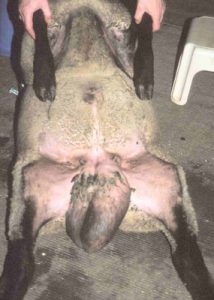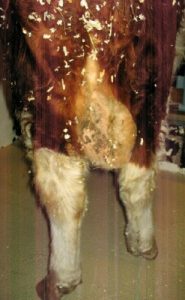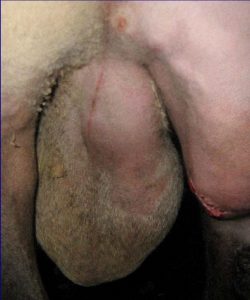FA youngstock processing
FA Inguinal Hernias
Unlike in adult stallions, inguinal hernias tend to be an incidental finding in ruminants and swine (including pot bellied pigs) of all ages. Most cases do not cause strangulation of the intestines and are not emergencies. If you see an enlarged scrotal neck, you should immediately put inguinal hernia at the top of the differential list. Other findings would include a soft, reducible, non painful swelling and intestines entering the inguinal ring on rectal examination. Ultrasound can be used to confirm if needed.



Inguinal hernias in youngstock are considered heritable in most species. Herefords and pigs are particularly prone. Animals should be castrated or not used for breeding. Inguinal hernias in bulls and rams are potentially acquired. While some consider these hernias a delayed manifestation of an inherited issue, others claim the inguinal ring is “stretched” by right lateral recumbency and the growth of a fat pad in the region. Inguinal hernias can be found in females and castrated males but uncommonly.
Evisceration at the time of castration is the main concern.
Castration and hernia repair
In young animals, castration is performed with the animal in dorsal recumbency and the intestines returned to the peritoneal cavity by twisting. After the testicle is exteriorized using a closed approach, the testicle is held away from the body and the cord twisted. This twists the vaginal canal and pushes the intestines into the body. After the intestines are back in place, the tunic is ligated and/or the external inguinal ring closed to minimize the risk of evisceration:
Swine inguinal hernia repair video
Inguinal hernia repair in adult animals is best done under heavy sedation and/or general anesthesia in a hospital setting. Hemicastration should be performed to enable tight closure of the inguinal ring. Leaving room for the testicular artery to pass through the ring also means leaving room for re-herniation. If the testicle is left in place, the vasculature reqquies an opening big enough for 2-3 fingers.
In bulls, there isn’t really a canal, just rings directly apposed. To return hernia to abdomen, put the intestines in a sterile rectal sleeve and twist as for pig inguinal hernias. The ring can be closed with two horizontal, preplaced mattresses, holding the internal abdominal oblique to the caudal edge of the ring. Cover with an overlapping mattress suture.
Level B:
Key Takeaways
Inguinal hernias are considered heritable in most groups.
FA inguinal hernias are rarely emergencies.
Castration of affected animals should be performed carefully to minimize the risk of evisceration.
Resources
Abnormalities of the Scrotum and Testes, 2024 VCNA
J Rush et al. Theriogenology question of the month, 2017 JAVMA 250(4) – inguinal hernia in bull
Surgical treatment for different hernias in sheep and goats, JVetSci 2007
Bull examination and testing -Crookwell Veterinary Hospital; includes a classic image
JM Ewoldt. Surgery of the scrotum, Vet Clin Food Anim 24 (2008):253–266

